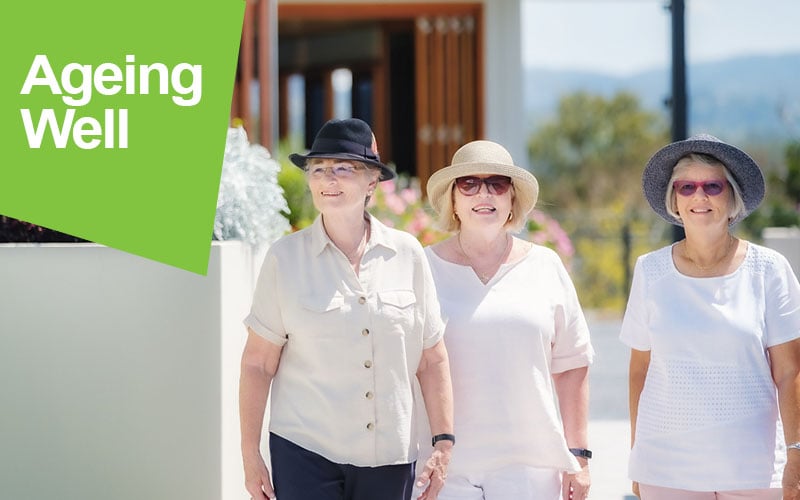Keep cool this summer with tips from our ageing well experts

As the scorching Queensland sun beats down, it's important to remember that not everyone is equipped to handle extreme heat. Among those most vulnerable are the elderly residents of Queensland. Heatwaves can take a severe toll on their health, potentially leading to serious complications and even an increased risk of mortality.
The Vulnerabilities of Older Queenslanders
Older Queenslanders often contend with existing health issues that heighten their susceptibility to extreme heat. These conditions, affecting their respiratory systems, can exacerbate discomfort during heatwaves.
Beyond physical health, they may struggle with planning for and responding to heat and fire hazards, including accessing cooling and maintaining essential services. Emotionally, extended heatwaves can amplify feelings of loneliness, fear, and anxiety, with pride often hindering them from seeking assistance, further increasing their vulnerability.
The Wesley Mission Queensland Ageing Well team shares practical tips to help you find that balance.
Some health conditions, such as kidney disease, heart problems, cancer and some neurological conditions require extra considerations, as exercising in hotter weather can place a lot of stress on the body. Seek advice from an accredited exercise physiologist if you need assistance.
- Libby Oolis, WMQ's Exercise Physiologist.
Keeping cool in the heat
• Sip on water throughout the day to stay hydrated, even if you don’t ‘feel’ thirsty. Dehydration can be especially risky for seniors and can exacerbate health issues during summer.
• Carry a reusable water bottle with you wherever you go – and be aware that alcohol, sugary drinks and caffeine in tea and coffee can make dehydration worse.
• Dress not only in lightweight, breathable fabrics but also in light colours. Light coloured clothing reflects most of the visible wavelengths which, in turn, absorbs less heat.
• Don't forget a wide-brimmed hat and sunglasses to shield yourself from the sun's rays.
• Use sunscreen and makeup with SPF. Keep in mind that the SPF level in foundation isn't quite as strong as it claims, so make sure to apply sunscreen first.
• Spring means pollen allergies for some. Keep antihistamines handy if you're prone to allergies.
• Consider a check-up with your healthcare provider to identify and manage health issues that can be aggravated during spring and the summer months.
• Plan your day around the heat. Check weather forecasts, especially heatwave warnings, and avoid being outdoors between 10am-4pm.
• Stay indoors on extremely hot days. Use air conditioning or fans, close curtains and blinds early in the morning, and check on your elderly neighbours to ensure their safety as well. Take a cold shower and use a damp washcloth to stay cool.
• If you don’t have air con, consider visiting a family member or neighbour with an air-conditioned home, or go to the library, shopping centre or cinema.
• Eat lighter, easy-to-digest meals. Heavy or hot foods can raise your body temperature. Include plenty of cold fruits and vegetables in your diet to stay hydrated.
• Monitor your health. Keep an eye on how you're feeling. If you experience symptoms of heat-related illnesses like heat exhaustion (e.g., heavy sweating, weakness, nausea) or heatstroke (e.g., high body temperature, confusion, loss of consciousness), seek medical attention immediately.
• Keep an eye on your toilet habits. Ensure that you’re urinating as usual and that the colour is normal.
• Create cross-ventilation. Open windows on opposite sides of your home to create a cross-breeze, which can help cool indoor spaces without air conditioning.
• Keep windows and blinds closed early in the morning to keep the heat out. Open the windows at nights with a cool breeze.
• Use cooling products like cooling towels, damp washcloth, neck wraps, or personal fans.
• Take a refreshing shower or bath with cool water to help lower your body temperature.
• Stock your fridge with cold water and freezer with ice and store all juicy fruits in the fridge.
How you can help
So, what can you do to support older Queenslanders during heatwaves and other challenging times?
• Check-In Regularly: If you have elderly neighbours or relatives, make an effort to check in on them regularly. A simple phone call or visit can make a world of difference.
• Offer Assistance: Extend a helping hand by offering assistance with tasks such as grocery shopping, preparing meals, or ensuring their home is adequately cooled.
• Create a Support Network: Encourage your community to establish a support network for older residents. This could involve organizing volunteers or community programs to provide aid during extreme weather events.
• Spread Awareness: Share information about the vulnerability of older individuals during heatwaves with your friends and family. The more people are aware, the better prepared we can all be to help.
By coming together as a community and looking out for our elderly citizens, we can ensure that they are better protected and cared for during heatwaves and other emergencies. Let's make a commitment to support those who have paved the way for us, ensuring they enjoy a safe and comfortable life in their golden years.
Ageing well with WMQ
Our compassionate approach is what makes us extra special!
At Wesley Mission Queensland, we pride ourselves on care that is tailored around you and your needs. Experience the difference today. Explore our website or call 1800 448 448.